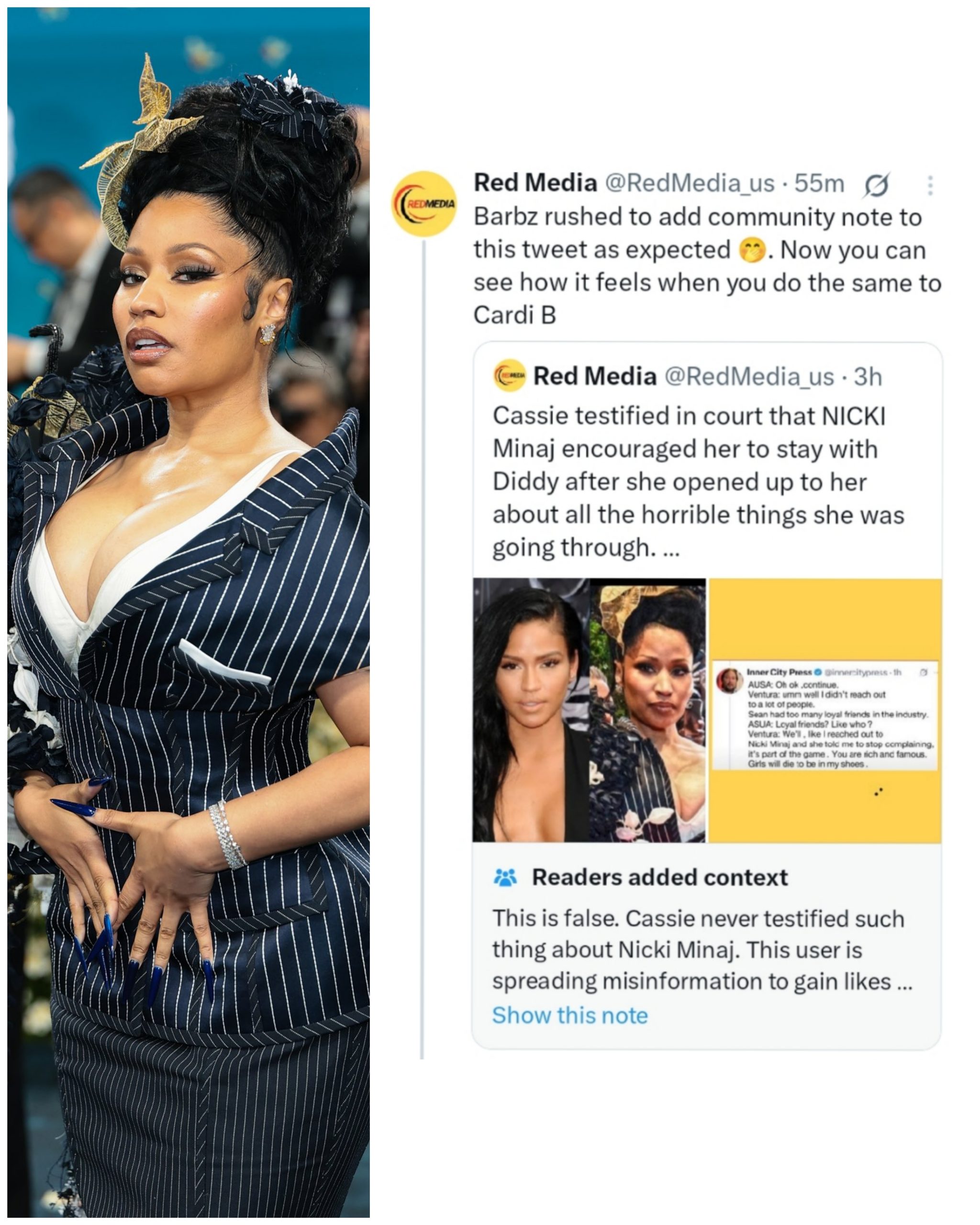Published: May 16, 2025
In today’s fast-paced digital world, misinformation spreads faster than ever—especially on social platforms like X (formerly Twitter). The latest firestorm involves Red Media (RedMedia_us), which ignited a wave of backlash by sharing a now-debunked claim about singer Cassie Ventura, rapper Nicki Minaj, and music mogul Sean “Diddy” Combs.
False Claims Go Viral: Red Media’s Controversial Tweet
On May 16, 2025, Red Media posted a tweet (Post ID: 1923386464689148156) alleging that Cassie Ventura testified in court that Nicki Minaj encouraged her to stay with Diddy despite enduring abuse. The tweet even included a screenshot supposedly from Inner City Press innercitypress, a trusted outlet covering the US v. Sean Combs trial.
But just minutes later, Inner City Press publicly denied the claim (Post ID: 1923388955665269087), stating that no such testimony was ever made. They made it clear: Nicki Minaj’s name was not mentioned in Cassie’s actual court testimony.
Despite the debunking, Red Media doubled down—mocking Nicki Minaj’s fans (known as the Barbz) for flagging the tweet. They wrote, “Barbz rushed to add community note to this tweet as expected… now you can see how it feels when you do the same to Cardi B.” The post framed the lie as payback in the long-standing Nicki vs. Cardi fan rivalry.
Nicki Minaj and Cardi B: A Feud Fueled by Fans
The feud between Nicki Minaj and Cardi B has been one of the most talked-about celebrity rivalries of the last decade. From physical altercations at New York Fashion Week to heated exchanges online, the tension between these two rap superstars continues to dominate headlines.
Their respective fanbases—Barbz and the Bardi Gang—are notorious for clashing online. The Red Media post exemplifies how stan culture can distort truth and weaponize real trauma for digital clout.
Cassie’s Real Testimony: What Actually Happened in Court
Cassie Ventura’s actual testimony, as reported by CNN on May 15, 2025, was harrowing. She detailed years of abuse at the hands of Sean Combs, including a 2016 incident where he allegedly punched her, causing visible injuries captured on hotel surveillance.
Red Media’s fabricated story not only twisted the facts but also disrespected a survivor’s account for the sake of internet engagement.
Backlash Mounts: Social Media Demands Accountability
Users on X quickly called out Red Media for spreading harmful misinformation.
FeelTheBass86 warned: “You have a lawsuit to worry about.”
FractionSleezee wrote: “Weaponizing Cassie’s trauma so you can get back at Barbz is not going to make Cardi B any more beautiful.”
HOTNlKA and BeautyNBars criticized the ethics of using falsified screenshots and misrepresenting credible journalism.
YSLONIKA reaffirmed support for both Nicki Minaj and Cassie, calling out the manipulation of a serious topic.
A community note was promptly added to the original tweet, further highlighting Red Media’s falsehood.
The Bigger Picture: Misinformation and Fan Culture on Social Media
This controversy is part of a growing problem—how misinformation spreads unchecked on social platforms. Research from PMC and MIT shows that fake news spreads significantly faster than the truth, especially when the content triggers strong emotions like outrage, sympathy, or loyalty.
In this case, Red Media’s post preyed on the emotional intensity of the Nicki vs. Cardi feud, ensuring viral traction at the cost of credibility and ethics.
Ethical Fallout: Journalism vs. Clout Chasing
Red Media’s response revealed the true motive: retaliation. By their own admission, the post was intended to provoke the Barbz rather than report facts. This raises serious questions about journalistic responsibility and the dangers of exploiting sensitive topics for engagement.
Inner City Press, whose name and content were misused, could pursue legal action. Many users, including Onika4Barbz__, called for a lawsuit to hold Red Media accountable.
What Media Platforms and Outlets Can Learn
For platforms like X, this incident proves the urgent need for stricter misinformation control—fact-checking tools, verified sourcing, and rapid-response teams are essential. Community notes are a step in the right direction, but they rely on users to act quickly and consistently.
For media outlets, credibility is everything. Once it’s lost, it’s hard to regain. Sensational headlines might drive clicks, but ethical journalism builds long-term trust.
Conclusion: Truth Matters—Even in Fan Culture
The Red Media controversy is more than just another stan war. It’s a reminder that real people, real victims, and real reputations are affected when falsehoods go viral. As the online feud between Nicki Minaj and Cardi B fans continues, we must not lose sight of the truth—or the responsibility that comes with publishing it.

